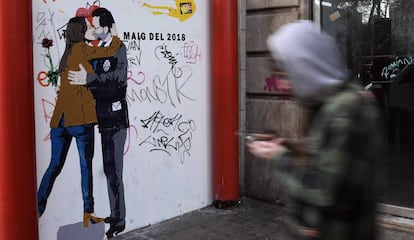It’s not about the undecided voters, it’s about hidden abstention
The real issue is how many people who said they would vote end up staying at home instead

One out of every four Catalans had yet to decide which way to vote just one week ago. There are many undecided voters in Catalonia, but odd as it may sound, it is likely that their votes will not be all that decisive.
The first reason is that many undecided voters will end up staying home. According to calculations based on the last poll by the Spanish public research center the Center for Sociology Studies (CIS), nearly half of these individuals also stayed home at the last regional election in 2015: 37% of them said so clearly, while 7% said they cast blank ballots or voted for very small parties.
Nearly every undecided voter is hesitating between parties within one of two specific blocs
Secondly, this kind of vote will probably go to a wide variety of parties. In 2015, 22% of undecided voters finally cast their ballots for the pro-independence Junts pel Sí, 9% for the Catalan Socialists (PSC), 7% for Ciudadanos, 7% for the Popular Party (PP) and 6% for Podemos. It is to be expected that a similar distribution will occur this time around.
It is also unlikely that undecided voters will make a dent on the resulting majorities. Nearly every undecided voter is hesitating between parties within one of two specific blocs. Around 6% of Catalans are torn between two pro-independence parties. Another 4% wonder whether to vote for the anti-independence Ciudadanos, PSC or PP. But only 2% are hesitating between a secessionist and a constitutionalist party.
So why do undecided voters matter? They are mostly an indication of the abstention rate. Not being sure which way to vote is the first step towards not voting at all. It is generally assumed that parties with undecided supporters are at risk. This should be of particular concern to Catalunya en Comú-Podem and to the PSC: 26% of the former’s previous voters and 23% of the latter’s are now unsure who to vote for. And 18% of Junts pel Sí voters are undecided, but its successors, ERC y JxCat, could argue that this is because people are torn between the two secessionist parties, not because they have lost their motivation to vote.
Voters say that they will cast their ballot, but will they stick to their word?
There has been a lot of talk in Catalonia about the hidden vote, but perhaps it would be best to wonder about hidden abstention. Surveys are predicting a record turnout rate based on a survey by the CIS where respondents said they would vote “in all certainty” in the following proportions: 98% of JxCat voters, 98% of ERC voters, 96% of Catalunya en Comú voters, 96% of Ciudadanos voters, 94% of PSC voters, 88% of CUP voters and 84% of PP voters. These are extremely high figures, even compared with the 2015 election, when voters were already highly motivated.
Two conclusions have emerged in recent days. One is that separatists are as highly mobilized (or more) as they were in 2015. The other is that supporters of Catalonia remaining a part of Spain are also highly mobilized.
But these are no more than intentions, after all. Voters say that they will vote, but will they stick to their word or will there be hidden abstentions? There could be surprises in more ways than one: some secessionists may finally stay home after three months of living on an emotional rollercoaster. But some constitutionalists could do the same. These two unknowns will make the difference on Thursday, and predicting figures is very hard for the same reason: because abstention is something that people almost never admit to.
English version by Susana Urra.
Tu suscripción se está usando en otro dispositivo
¿Quieres añadir otro usuario a tu suscripción?
Si continúas leyendo en este dispositivo, no se podrá leer en el otro.
FlechaTu suscripción se está usando en otro dispositivo y solo puedes acceder a EL PAÍS desde un dispositivo a la vez.
Si quieres compartir tu cuenta, cambia tu suscripción a la modalidad Premium, así podrás añadir otro usuario. Cada uno accederá con su propia cuenta de email, lo que os permitirá personalizar vuestra experiencia en EL PAÍS.
¿Tienes una suscripción de empresa? Accede aquí para contratar más cuentas.
En el caso de no saber quién está usando tu cuenta, te recomendamos cambiar tu contraseña aquí.
Si decides continuar compartiendo tu cuenta, este mensaje se mostrará en tu dispositivo y en el de la otra persona que está usando tu cuenta de forma indefinida, afectando a tu experiencia de lectura. Puedes consultar aquí los términos y condiciones de la suscripción digital.









































